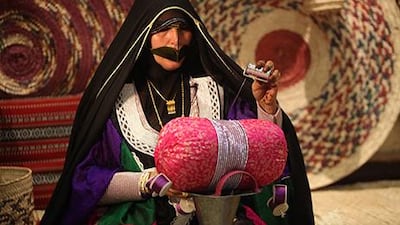Some traditions are celebrated openly, such as yola dancing or camel racing. Others continue quietly and without spectacle. Talli work is one of them.
Video: 32. Traditional "talli" embroidery stand
Talli, a form of traditional Emirati embroidery still practiced today, has long been used to embellish the collars and cuffs of women's clothing. Ateeja Ali Al Muhairbi recalls learning the intricate art form as young as eight years old.
--------------------------
The art of embroidery has been practised by women in the Emirates for so long, no one can be quite sure when it began.
It survives in an age of mass-produced clothing, passed down from mother to daughter and supported by institutions such as the handicrafts centre at the Abu Dhabi General Women's Union, where this example was made.
Ateeja Ali Al Muhairbi produces talli work at the centre, skilfully placing the spools of thread to create intricate designs for the collars and cuffs of abayas and other items of clothing.
In a time before tailors, women needed to learn the art of talli work, she explains. "We did everything on our own, talli and burqas and the like. We've always had the energy for this."
Women might work on their talli when their husbands left for the pearl diving season. As a young girl, Al Muhairbi recalls: "We were always looking forward to learning new things, to spare our mothers the effort, and even our aunts and neighbours for that matter."
Older examples of talli work would be made with real silver thread, imported from India. These days synthetic materials are more likely to be used.
The skill has even inspired poetry. One well-known Arabic verse runs:
"The one wearing the talli has captivated my heart.
With her long black hair flowing in the wind
In front of me she gracefully sways
A beauty playful and inviting.
Try as I may to describe her
No words could do my loved one justice.
The one wearing the talli has rendered me speechless."
Talli embroidery is still as popular as ever with women of all ages and is incorporated into the most fashionable designs.
"We've never abandoned our customs and traditions," Al Muhairbi says. "Wherever we go, whatever we do, our talli is always with us."

